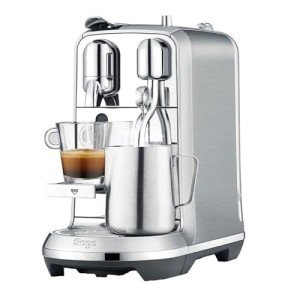How To Make A Profitable Energy-Efficient Espresso Machines When You're Not Business-Savvy
Energy-Efficient Espresso Machines: A Comprehensive Guide
On the planet of coffee lovers, espresso machines are typically related to as important devices for brewing abundant, fragrant coffee. Nevertheless, the energy usage associated with these machines can lead to increased utility expenses and ecological concerns. As customers become more eco-conscious, energy-efficient espresso machines have actually become a popular option. This post aims to explore the functions, benefits, and options offered in energy-efficient espresso machines, assisting coffee lovers make notified options.
What Makes an Espresso Machine Energy-Efficient?
Energy-efficient espresso machines are developed to minimize energy consumption while maintaining optimum performance. Several functions add to the energy effectiveness of these machines:
Insulation: High-quality insulation assists maintain heat, minimizing the energy required to keep ideal developing temperature levels.
Smart Technology: Many modern machines are geared up with programmable settings that enable users to schedule brewing times and change to standby mode when not in use.
Quick Heat-up Time: Energy-efficient espresso machines frequently use innovative heating technologies, such as thermoblocks or PID controllers, to heat water rapidly.
Low Wattage: Machines that operate at lower wattages consume less energy in general, making them more efficient.
Automobile Shut-off: Automatic shut-off features make sure that the machine turns off after a certain period of inactivity, more minimizing energy waste.
Benefits of Energy-Efficient Espresso Machines
Purchasing an energy-efficient espresso machine can offer several advantages:
Cost Savings: Over time, lower energy consumption can cause lowered electrical power bills.
Environmental Impact: Using less energy lowers carbon footprints, making these machines a more sustainable choice for ecologically conscious consumers.
Improved Performance: Many energy-efficient designs also provide exceptional brewing innovations, leading to better-tasting espresso.
Toughness: Typically, energy-efficient machines are built with high-quality elements, leading to higher longevity.
Functions to Consider
When choosing an energy-efficient espresso machine, a number of features ought to be taken into account:
- Type of Machine: Options include manual, semi-automatic, and fully automatic designs, each with differing degrees of user control and automation.
- Brew Quality: Look for machines that use high-quality brewing systems to guarantee ideal taste extraction.
- Upkeep: Some machines have self-cleaning features that can conserve energy and effort in maintenance.
- Capacity: Depending on personal or family size, machine capacity can affect energy usage, with larger machines typically needing more power.
Popular Energy-Efficient Espresso Machines
The market provides a variety of energy-efficient espresso machines catering to various needs and choices. Below are some notable designs:
Brand
Design
Secret Features
Energy Consumption
Breville
Barista Express
Integrated grinder, PID temperature control, fast heat-up.
Low
DeLonghi
EC155
Compact size, easy to use, durable develop.
Moderate
Rancilio
Silvia
Durable style, outstanding temperature stability, and has a low environmental impact.
Moderate
Gaggia
Classic
Reliable manual operation, durable brass elements, and effective steaming ability.
Low
Jura
E8
Fully automatic, wise functions, and a removable brew group for easy cleansing.
Low
Tips for Optimal Energy Efficiency
Aside from selecting an energy-efficient design, consumers can adopt numerous practices to maximize energy effectiveness:
- Preheat: If your machine has a pre-heating function, use it to make sure that the optimal temperature level is reached rapidly before brewing.
- Turn Off After Use: Always turn off the machine after brewing or use machines with automobile shut-off features.
- Regular Maintenance: Keep the machine properly maintained to ensure it operates efficiently and effectively.
FAQs About Energy-Efficient Espresso Machines
1. Are energy-efficient espresso machines more costly?
While the preliminary financial investment may be higher for energy-efficient models, the long-lasting cost savings on electricity bills can offset the initial cost. Furthermore, lots of energy-efficient machines included sophisticated functions that improve the developing experience.
2. How do view it now know if an espresso machine is energy-efficient?
Try to find indicators such as Energy Star certification, user reviews, and requirements regarding wattage and heat-up time. Machines with specific functions intended at lowering energy usage are usually designed for much better performance.
3. Can I use an energy-efficient espresso machine for other coffee styles?
Numerous energy-efficient espresso machines provide versatility, enabling users to brew various coffee designs beyond espresso, such as lattes and cappuccinos, by integrating steaming capabilities.
4. Do energy-efficient designs sacrifice quality for efficiency?
Not necessarily. Numerous energy-efficient espresso machines are geared up with high-quality brewing technology that can boost flavor extraction while reducing energy intake.
5. What upkeep is required for energy-efficient espresso machines?
Regular upkeep involves cleaning up the machine, descaling when required, and regularly checking seals and gaskets to make sure optimal efficiency and energy effectiveness.
Energy-efficient espresso machines represent a best blend of efficiency, savings, and environmental responsibility. By thinking about different functions, advantages, and brand names, customers can choose a model that suits their special preferences while contributing positively to the environment. As the pattern towards sustainable living grows, the popularity of energy-efficient home appliances, consisting of espresso machines, is most likely to continue its upward trajectory, using coffee enthusiasts a guilt-free way to enjoy their daily dosage of espresso.
